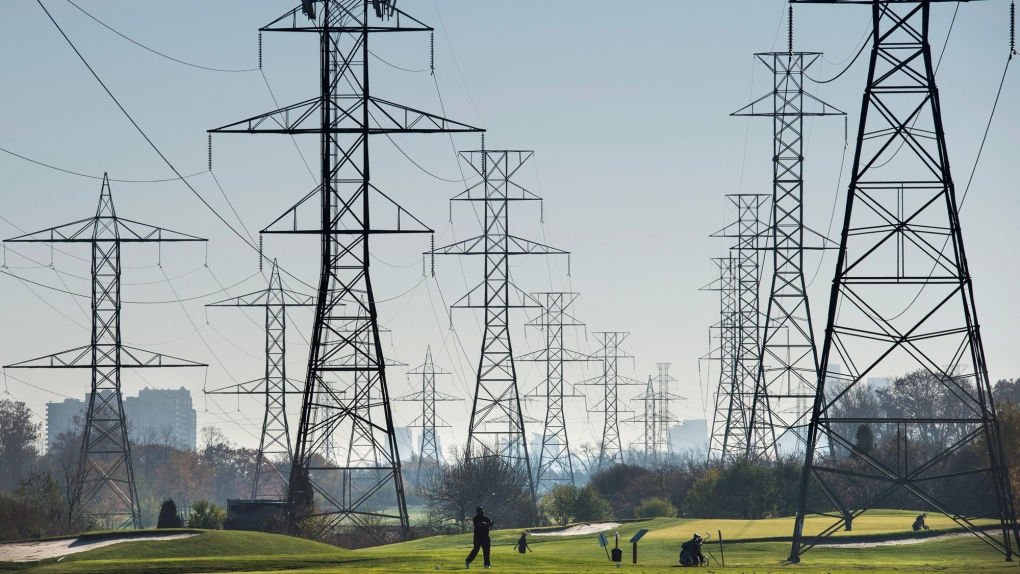Hydro capacity 'tightness' could cause energy shortfalls in Ontario this summer, report warns
 Hydro towers are seen over a golf course in Toronto on Wednesday, Nov. 4, 2015. (The Canadian Press/Darren Calabrese)
Hydro towers are seen over a golf course in Toronto on Wednesday, Nov. 4, 2015. (The Canadian Press/Darren Calabrese)
The early spring heatwave in Ottawa brought something we may be seeing more of as the summer heats up: power failures.
Ontario’s electricity grid could be in a precarious spot, especially when demand spikes in a heat wave, according to a new report.
A North American electricity regulator says Ontario is the only province in Canada that is at risk of an energy shortage, which means power outages.
"That’s all because of the tightness of the capacity situation in Ontario and that’s mainly driven by four nuclear units that are out for fairly significant refurbishment," said Jim Robb, president of the North American Electric Reliability Corporation.
Robb says nuclear refurbishment at a number of sites, including Darlington, are a factor but there are risks to the province’s energy shortage including the province’s growth.
"What has been problematic for Ontario is that the IESO (Independent Electricity System Operator) has been looking to add capacity to the system and soliciting for new construction, but the response to that hasn’t been as robust as they had hoped," Robb said.
"Plus electrification policies that are starting to kick in, we are seeing those effects starting to kick in."
The situation is problematic as Ontarians get ready to crank the air conditioning this summer.
"If we find ourselves in a situation where we are in a heat wave, a one in ten year hot weather event, that becomes problematic," Robb said. "The biggest risk for Ontario this summer is if there is a heat dome, like we have seen form over the west over the last several summers. If a heat dome formed that encompassed both parts of Quebec and a large part of Ontario, you could find it very difficult to import the power that you need."
Robb said that’s the scenario that would lead to rotating outages.
Meanwhile, experts say there shouldn’t be a widespread outage like the blackout of 2003.
"The grid today is in much better shape today than it was 20 years ago, there’s been significant investments, which makes an outage like that much more unlikely," said Tom Chapman, an energy economist with the Brattle Group. "You can never rule it out but it’s certainly much more unlikely."
The NDP believes funding cuts to renewable projects are partially to blame for the regulator's findings. The Minister of Energy pushed back, saying the province's system is 90 per cent clean and attracting investments from around the world.
CTV News Ottawa reached out to Hydro Ottawa for comment, but did not hear back before publishing.
On June 1, thousands of customers in Ottawa's west end lost power during the hottest day of the year.
Hydro Ottawa blamed a strain on the system for the outages, caused by people turning on air conditioners.
CTVNews.ca Top Stories

Calgary woman stranded in Mexico after husband's death during diving trip
A Calgary woman is struggling to return home after her husband died while diving in Mexico, leaving her stranded and facing financial hardship.
Fugitive U.S. rioter seeks asylum in Whistler amid warnings of more to come
An American citizen convicted of participating in the Jan. 6, 2021, riot on Capitol Hill and dodging jail time in Whistler may just be the start of an asylum-seeking rush, according to a prominent legal expert.
Special national Liberal caucus meeting called for next week after regional chairs meet: sources
A special meeting of Prime Minister Justin Trudeau's national Liberal caucus has been called for next Wednesday, sources say.
N.S. community shocked by deaths of father, daughter; suspect was wanted in Toronto shooting
A Nova Scotia community is mourning the loss of two of its members after they were shot and killed in Halifax on New Year's Eve.
Canada pausing applications for parent, grandparent permanent residency sponsorships
Canada will not accept new parent and grandparent permanent residency sponsorship applications until further notice, according to a ministerial directive.
Soldier who blew up Tesla at Trump hotel left note saying blast was to be a 'wakeup call' for the U.S.
A highly decorated Army soldier who fatally shot himself in a Tesla Cybertruck just before it blew up outside the Trump hotel in Las Vegas left notes saying the New Year's Day explosion was a stunt to serve as a “wakeup call” for the country’s ills, investigators said Friday.
Sea and Himalayan salts recalled in Canada: 'Do not use, serve or distribute'
Two brands of sea and Himalayan salt are being recalled in Canada due to pieces of plastic found in the products.
'Inadmissible' foreign nationals to pay more upon return to Canada: CBSA
Foreign nationals who refuse or are unable to pay their own way home after being denied stay in Canada will soon face steeper financial penalties should they ever attempt to return.
'It's about time': Experts in Canada support call for warnings about cancer risk from alcohol
While Canada hasn't mandated cancer warnings for alcoholic beverages, a few experts are supporting a new push in the U.S. to have the labels on the products.


































